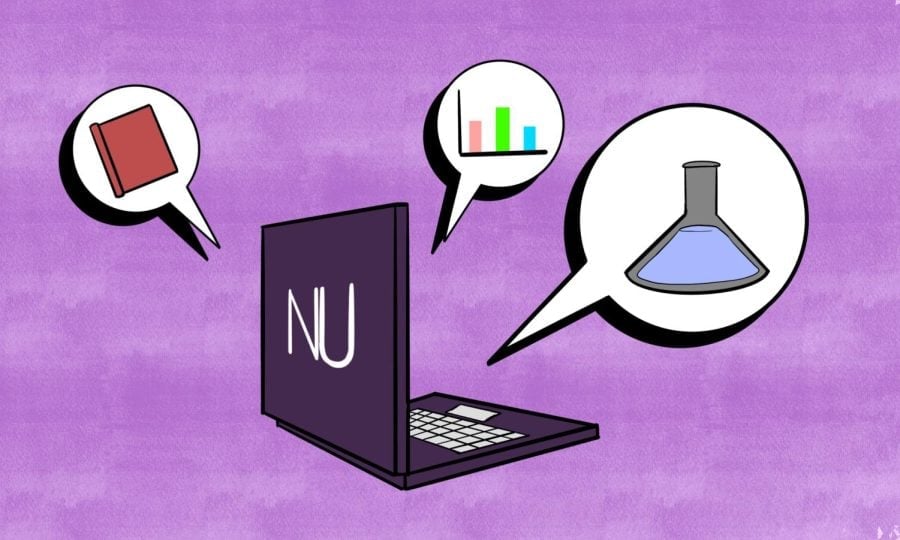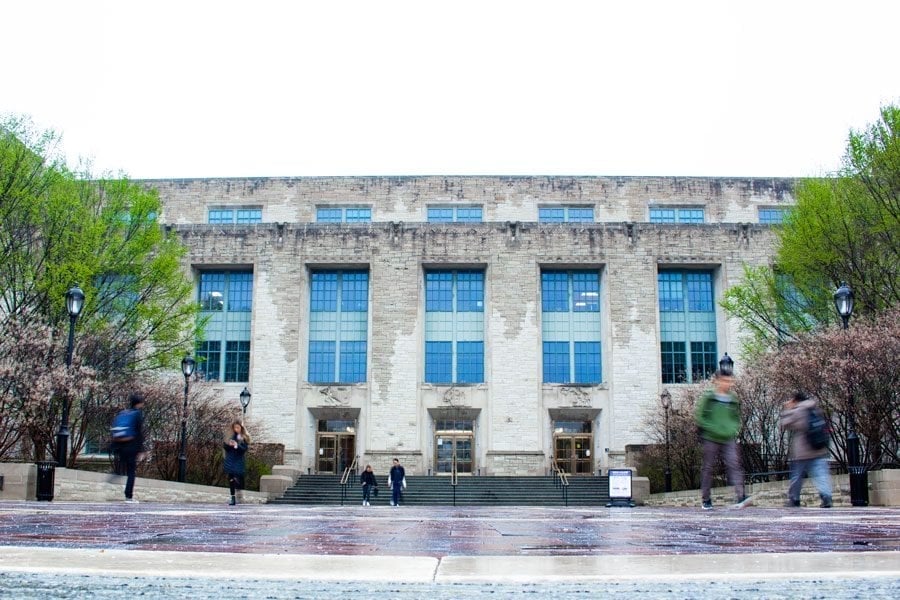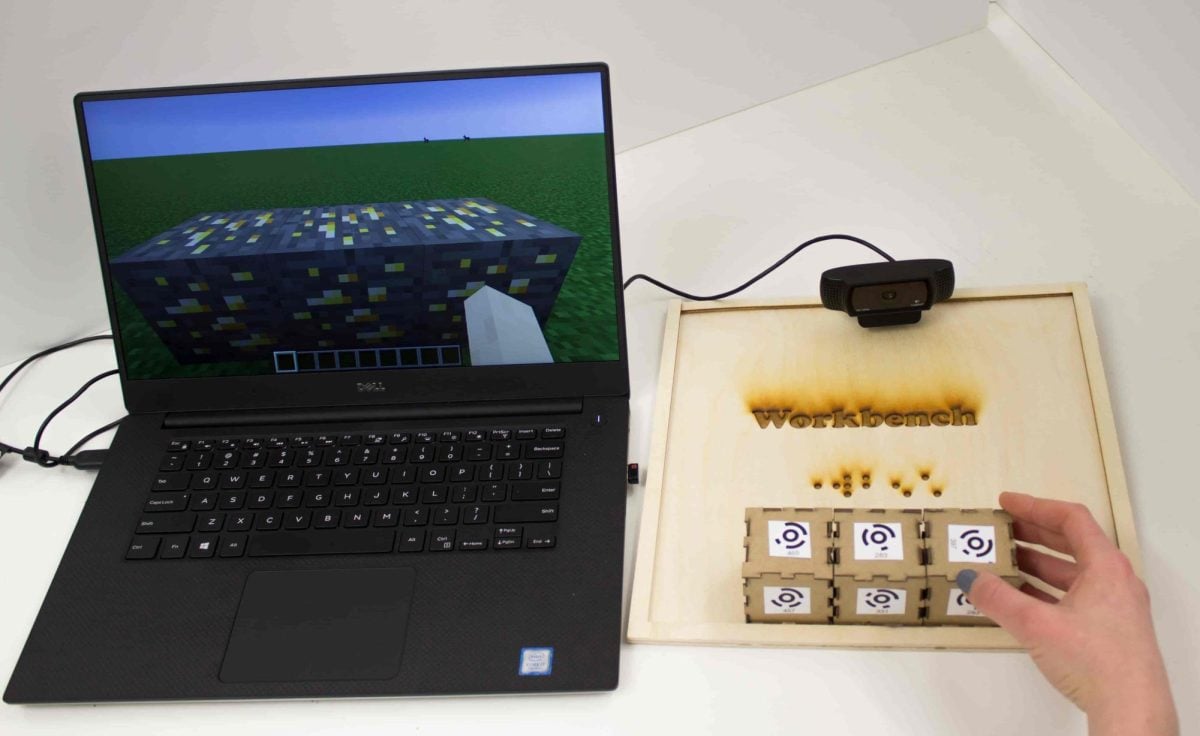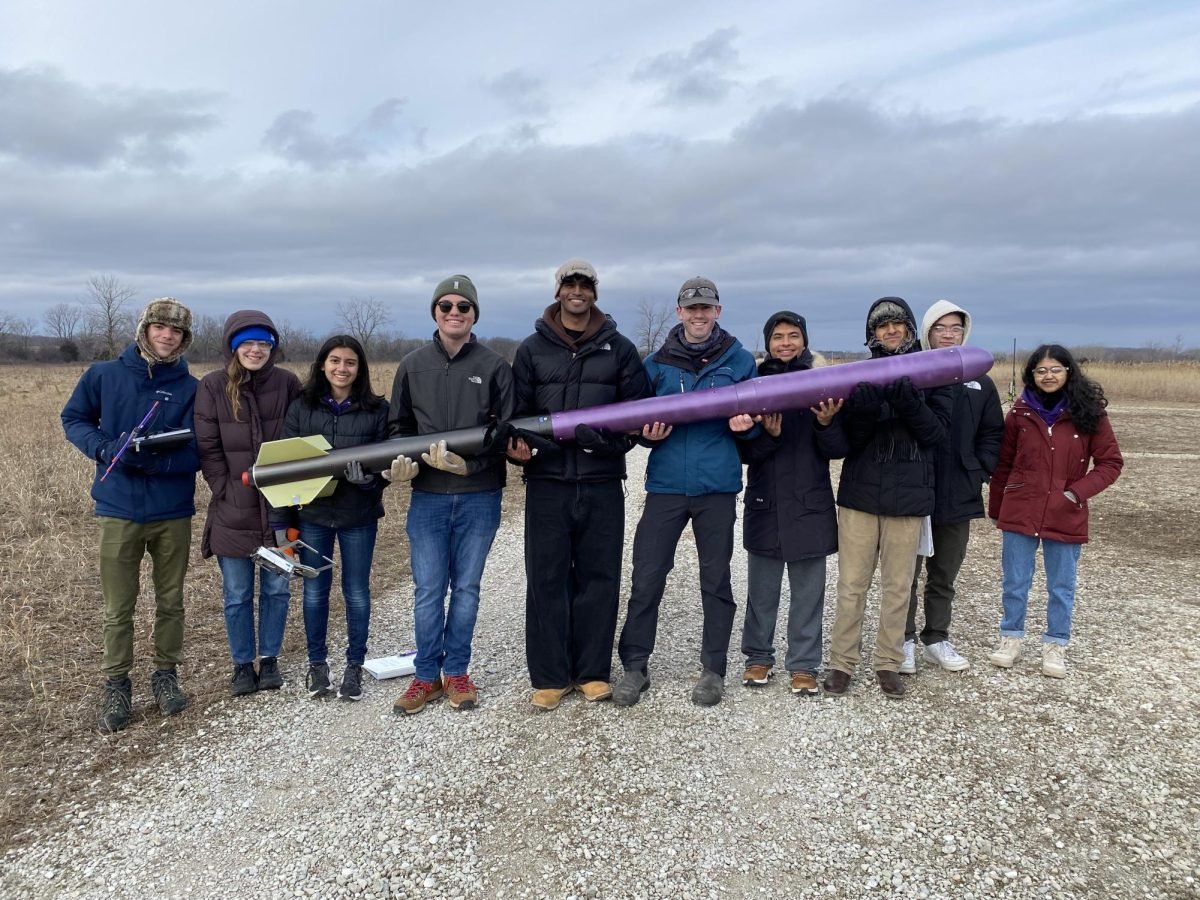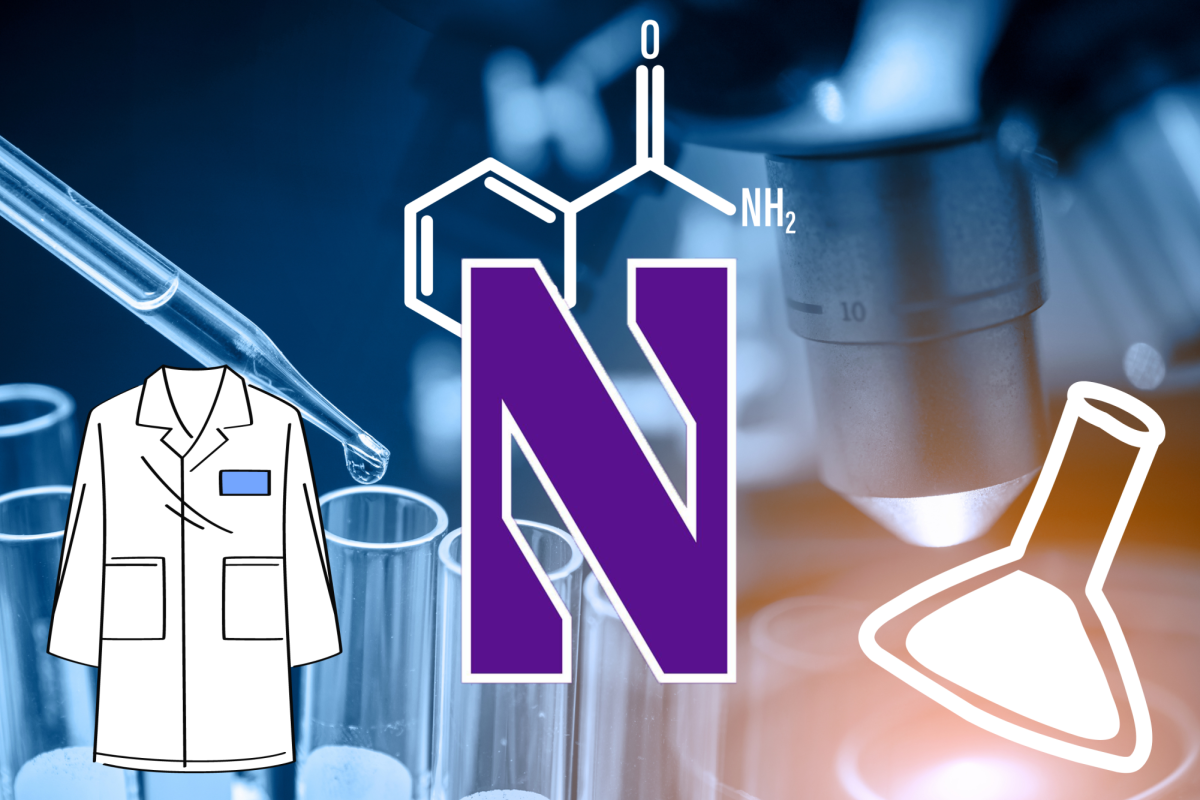Nearly 4,000 bleary-eyed students littered the classrooms, halls and auditoriums of the Technological Institute on that bitter January morning. Some brains worked feverishly, grappling with new information about existential environmental threats. Others could only focus on the free coffee and donuts awaiting them in Lecture Room 5. But on that morning in 1970, everyone in Tech was part of a movement that would change the world.
Paul Friesema, now professor emeritus of political science, was at Tech that day as a new faculty member and a participant in Project Survival, an all-night event that served as a sort of pregame for the nation’s first Earth Day. Leading environmental experts gave lectures and conducted break-out sessions on issues ranging from the importance of clean air to the threat of overpopulation. An estimated 10,000 students, faculty and community members participated in some capacity (with close to 4,000 staying all night). “Project Survival had to do with what was happening in the country,” Friesema says. “People were becoming much more aware of the environment as something precious that needed to have defenders. After Project Survival and the first Earth Day, there was an amazing array of important legislation and public policy that flowed from those types of events.”
The event commanded national media attention and helped generate support for legislation like the Clean Air and Water Acts and a ban on phosphates in the Great Lakes, Friesema says. Forty years later, environmental policy is again the focus of international debate – and scores of Northwestern students are making headway in the crusade for a cleaner, more sustainable Earth.On the Road to a Cleaner PlanetMcCormick senior Phil Dziedzic is used to getting curious looks on the road. When he pulls up next to other cars, fellow travelers frequently gawk and sometimes take pictures.
That’s because Dziedzic is the captain of NU’s Solar Car Team. When he drives the vehicle – which runs off of electricity generated by solar cells – in cross-country races, other drivers aren’t quite sure what to make of him. “A lot of people think it’s a spaceship. It doesn’t look like anything else on the road,” Dziedzic says.
The solar car team is just one environmental group at NU that is committed to taking their “save the planet” message far beyond the confines of campus. Whether through political initiatives or by physically tackling eco-friendly projects, Friesema says environmental activism at NU today is characterized by the diverse opportunities “green” groups provide. “People aren’t just limiting their demands to asking the government to do something,” he says. “There’s a lot more hands-on engagement now. That doesn’t supplant the advocacy, but it does add a rich dimension.”
Campus environmental organizations have thrived in the last few years, Friesema says. He cited the development of Students for Ecological and Environmental Development (SEED), the emergence of Engineers for a Sustainable World (ESW), Environmental Campus Outreach at Hillel (ECO) and the GREEN House as examples of rapid and powerful growth. “There’s been a real flourishing in terms of group action on this campus,” he says. Why green, why now?One interest all the groups share is a commitment to fight global warming. Sure, the climate change debate can be jargon-heavy (“Carbon footprint!” “Emissions standards!”). But the science behind it isn’t actually all that complicated, says Sunanda Katraggada, public relations chair for ESW. The general idea is that global warming is related to the amount of carbon in the atmosphere, she says.
“The world is like a greenhouse, with carbon dioxide keeping some heat in,” explains Katraggada, a McCormick junior. “Humans can survive on earth because of a moderate greenhouse effect, where a certain amount of heat comes in from the sun and gets trapped by a bunch of gases in the atmosphere.” But when too much carbon dioxide is emitted, the greenhouse effect is magnified and the earth overheats. That leads to all kinds of detrimental effects for the environment, from rising sea levels due to melting icebergs, to ocean acidification, resulting from excess carbon levels absorbed in the water.
What’s next? The climate forecast is pretty grim, according to Friesema: With sea levels rising globally already, the consequences of global warming are only going to get worse.
“The already-occurring changes induced by the rise of a couple degrees of temperature are already very painful to endure,” Friesema says. “Changes which you are going to endure in your lifetime are going to be dramatic and by and large very negative.”From campus to Congress…But in the last year, the campaign to stop global warming gained national and international traction. In June, the House of Representatives passed legislation (known as the American Clean Energy and Security Act of 2009, or the Waxman-Markey bill) that would implement a cap-and-trade system on greenhouse gases. The bill set a cap on the total amount of carbon that can be emitted nationally (seriously affecting industries like coal, steel and cement). That cap is lowered over time to reduce overall emissions. To adjust to doing business under that cap, industries receive a certain amount of carbon “allowances.”
Businesses can also “trade,” or sell, those allowances to other companies. “Think of the total amount of emissions as a giant pie,” says Elisa Redish, co-president of SEED and a Communication junior. “You split up the pie with some kinds of industries allowed more, versus others that can’t emit as much… some will reduce more and others less, but hopefully, it will add up to an overall reduction.”
NU students got behind that bill through SEED and Northwestern’s Oxfam chapter. The groups organized a petition drive that generated close to 500 signatures. Later, the petition was presented to an aide for Rep. Jan Schakowsky, who represents the ninth district of Illinois, which includes Evanston. She ultimately voted for the legislation in Congress. “I was just totally elated when it passed,” says Sam Eckland, SEED’s co-president and a Weinberg senior. “To give the Northwestern student body a voice on such a national scale is one of our primary goals.”
SEED will likely orchestrate a similar movement for the Senate version of climate change legislation, which was recently introduced, Eckland says. Laura Knezevic, the program director of the Illinois Student Environmental Coalition, lauds that kind of activism as one of the most effective ways to make a tangible contribution to the environment. “The real goal is to educate students on how they can take this energy for action and transform it into something that can have a much broader impact,” says Knezevic, who works on state and federal environmental legislation with Illinois college students. “Things that they’re doing on campus are wonderful, but if they want to really tackle issues, they have to do something on a larger level.”…to Copenhagen
For some students, tackling issues on that “larger level” means looking past campus, past Congress, all the way to Copenhagen.
The United Nations Climate Change Conference will be held in Copenhagen, Denmark from Dec. 7-18. The summit’s purpose is to create an international agreement to reduce climate change by stabilizing greenhouse gas levels. Liana Balinsky-Baker, a Medill senior and Daily deputy news editor, will represent an environmental education and policy organization at the summit, and Eckland is trying to find a way to attend the Conference as well. “Theoretically, Copenhagen is an opportunity to enact, or at least to negotiate, perhaps the most important international treaty ever,” Eckland says. “Every single country is going to have a seat at the table and is going to want to make their voice heard. This is going to be the largest environmental forum since Kyoto.”
In the last few weeks, however, the international community has downplayed the importance of Copenhagen, with
UN Secretary General Ban Ki-Moon saying a nonbinding political agreement (as opposed to rigid emissions standards) is more realistic. Questions about Congressional progress on climate change, plus disputes surrounding developing countries and the emissions standards to which they should be held, have slowed the momentum. “All the expectations we had at the beginning of last year are going down,”
Eckland says. “It’s not going to be a homerun, but hopefully we can get some kind of agreement, or at least start building a foundation.”
The upcoming conference in Copenhagen represents just a piece of the intricate puzzle of fighting climate change, Friesema says. “Copenhagen is one step in a long process,” Friesema explains. “One hopes negotiations will be fruitful and that the U.S. Congress will be supportive of whatever comes out of that. It’s a work in progress, but it’s not time to throw up our hands in despair.”Broadening the Base
Concern for the environment may be a sweeping, sometimes overwhelming issue with international implications, but at the NU Homecoming parade a few weeks ago, the subject was very local. SEED, ESW, ECO and the solar car team sauntered down Sheridan in tandem with their carbon-neutral float, wielding signs with catchy slogans like “Got Purple? Go Green.”
By bringing the environmentalist movement outside of classrooms and meetings in Norris, the groups tried to reach students whose connections to the environment might be less about legislation and more about recycling the occasional beer bottle. Helping those students — one might call them the average students — develop a stake in the environmental movement is critical, Eckland says. “If you view groups like ESW, ECO, SEED and Ecco Living (a student group that markets eco-friendly school supplies) as an environmental brain trust, it’s sort of an environmental bubble,” Eckland says. The goal of increased environmental awareness and programming is for such environmental efforts to “trickle out to other people in the whole campus community,” he says.
Of course, the serious environmentalists on campus get some help spreading that message from the whole “green is hip” trend. When students sport those (semi-)ironic Urban Outfitters “Go Green” T-shirts , they’re generating interest in the cause, even if they don’t realize it, says Dziedzic of the NU Solar Car Team. “They’re like walking billboards, even if they aren’t doing anything terribly significant for the environment,” Dziedzic says. “Even if they’re just buying into the environmental fad, it’s better than nothing, because it’s better to be aware of it than not.”
Eckland says whether one is a die-hard environmentalist, a trendy twentysomething or just someone who tries to turn off the lights sometimes, any contribution one can make to the environment is valuable – especially, he adds, because one “green” act is likely to lead to another. “As an environmental activist, I have no issue with the pseudo-environmental movement,” Eckland says. “Whether or not it’s always genuine, it’s still making people think about the environment. We just hope that we’re raising awareness of all the ways the environment can affect a student’s daily life.”Everyone’s Doing It…However one chooses to view the environment, one thing is certain: Very soon, everyone is going to be talking about it.
The next month will see skyrocketing interest in climate change legislation at both national and international levels as the Copenhagen conference date nears and debate heats up in the Senate, says Katy Hintzen, an organizer at Chicago’s Environmental Law and Policy Center. “The (Senate) climate change legislation is moving a little more behind-the-scenes,” Hintzen says. “But once health care is done and coming up to Copenhagen, we’re going to hear a lot more about it. There’s going to be an explosion of activity on this bill. Just wait a month and it’ll be all over the place.”
Friesema predicted the global warming debate could become the next health care drama because it, too, affects myriad interests. “One could have a type of controversy over this which rivals the controversy over health care,” Friesema says. “It cuts deep into many industries. There will be lots of pain and anguish, and that will be reflected in how decision makers fashion responses for national and global needs.”
Friesema, who witnessed firsthand the energy of the go-green movement a generation ago, says today’s environmentalists also have the opportunity to shape the outcome of the national and international save-the-planet movement. “There’s a lot of student interest now, as there was then, but now there’s more of a diversity (of avenues for action),” Friesema says. “I have high hopes for this generation of environmentalists.”
GET YOUR GREEN ON
Even if you can’t jet off to Copenhagen for the most important climate conference since Kyoto, you can still tune in to (and in some cases, attend) environmental events in Evanston and beyond:Nov. 5: Climate Change Symposium. Leading academics will address global warming by exploring topics like, “Couples Therapy for the Marriage between Science and Policy” and “Responses to Climate Change Policy: a Reality Check on Alternative Energy.” McCormick Tribune Building, 8:45 a.m.-3:45 p.m.Nov. 7: Energy Day, sponsored by Engineers for a Sustainable World (ESW). Representatives from a variety of energy sectors will discuss green alternative energy options. Tech LR3, 9:30 a.m.-4:00 p.m.NOW: The Senate Environment and Public Works Committee is holding hearings on a bill that offers proposals for fighting climate change. Washington, D.C.Dec. 7-18: United Nations Climate Change Conference. This international summit will seek to establish an international consensus on greenhouse gas emissions levels. Copenhagen, Denmark.

